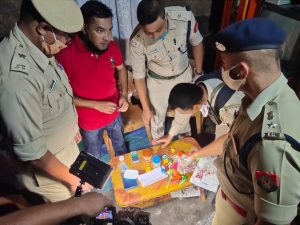Rajeev Bhattacharya

Narcotics seized by Assam Police during a crackdown on the drug trade in May 2021.Credit: Assam Police
Among the many trends discernible from the ongoing crackdown on narcotics in India’s northeastern state of Assam is the deluge of different varieties of drugs that are coming in from Myanmar.
As many as 441 people, including peddlers, were arrested by the police and 264 cases registered over a period of three weeks in the crackdown on the narcotics trade that began in May in Assam. The seizures included cannabis, heroin, synthetic drugs (Yaba), brown sugar, opium, and prescription drugs such as Phensedryl and sleeping pills.
Although police have not yet released figures of the total amount confiscated so far, prescription drugs and brown sugar appear to have topped the list.
While prescription drugs are reportedly sourced from manufacturing units located far-off in the northern states of the country, brown sugar is imported from laboratories in Myanmar through routes that pass through the Indian states of Mizoram and Manipur which border Myanmar.
Occasionally, smaller quantities of brown sugar are also dispatched to the country’s mainland from the laboratories that have sprung up in Manipur.
Brown sugar is derived from opium but the process of manufacturing varies depending upon the methods and precursor chemicals used. Opium is often mixed with hydrochloric acid and sometimes additives such as caffeine. The final product is only 20-30 percent pure, which users smoke after heating the powder.
The refined form of brown sugar is Heroin No 4, which is filtered with the addition of more ingredients such as ether. The product which has a purity of 80– 90 percent is injectable and more expensive than brown sugar. It has been seized frequently not only from Assam but other states in India’s northeast, as well.
According to the U.S. Drug Enforcement Administration, Myanmar produces 80 percent of the heroin in Southeast Asia and is responsible for 60 percent of the world’s supply of heroin.
The UNODC Regional Office for South East Asia and Pacific has estimated that the area under poppy cultivation in Myanmar estimated at 29,500 hectares had decreased by 11 percent in 2020 over the previous year. This was a continuation of the downward trend that had started in 2014.
However, there are areas in Myanmar’s Kachin and Chin states that are contiguous to India’s northeast where poppy is grown and supplied to laboratories located not far from the border between the two countries. They are no longer concentrated only in Shan State, which explains the new term Golden Pentagon used to denote the drug manufacturing region larger in area than the Golden Triangle.
It was sometime in the early 1990s that many heroin laboratories in Myanmar started manufacturing synthetic drugs such as Yaba as it was less expensive and not dependent on the supply of opium.
Yaba is a mix of methamphetamine and caffeine that comes in different flavors and colors. Inhaling its fumes induces a hyper-alert state. There is also a crystalline version of this drug called Ice made up entirely of methamphetamine.
Yaba and another synthetic drug known as “World Is Yours” have been confiscated in Assam and other parts of India’s northeast over the past several years.
Compared to brown sugar and prescription drugs, the continuing crackdown in Assam has yielded smaller amounts of Yaba, since most of the Yaba consignments are exported to Bangladesh through routes that avoid cities. Mankachar in Assam is one of the hotspots along the India-Bangladesh border where Yaba has been repeatedly seized by the border police.
No comments:
Post a Comment